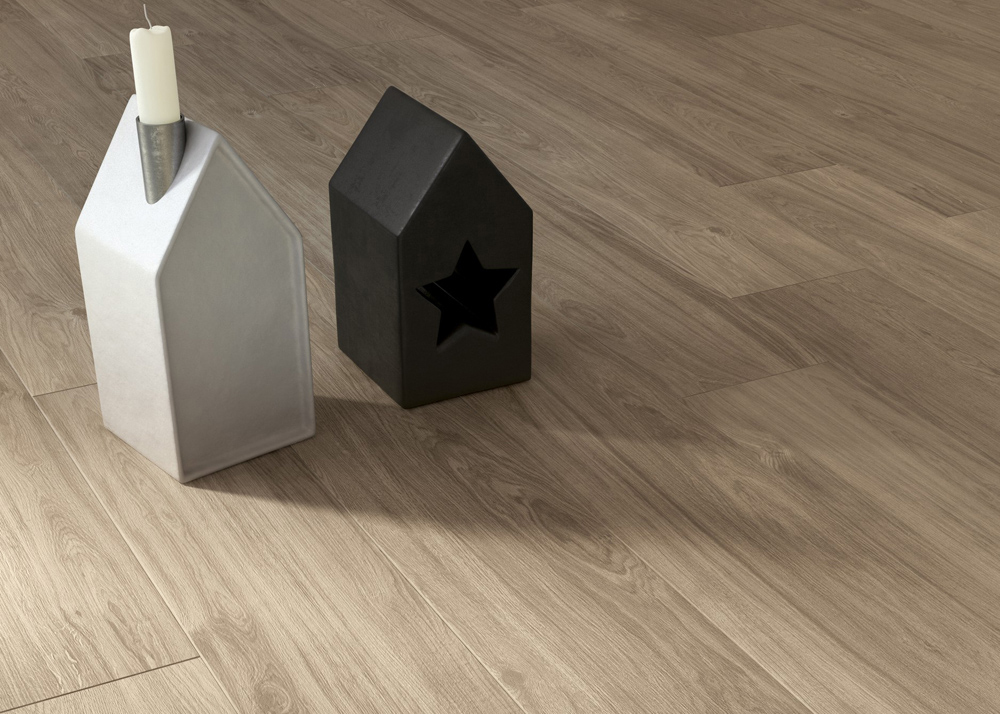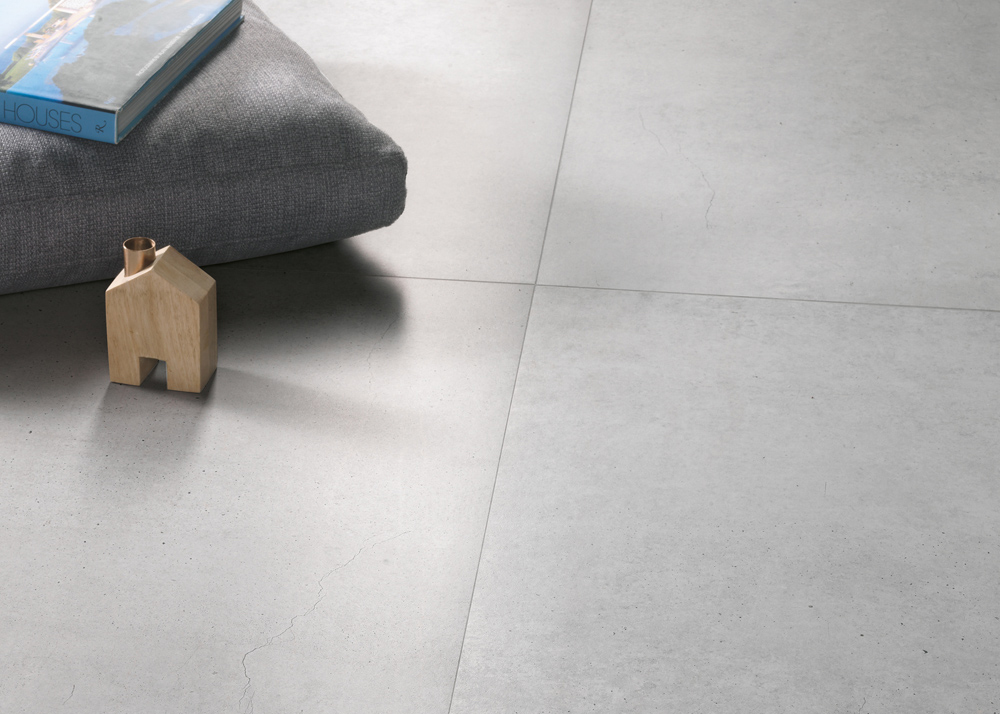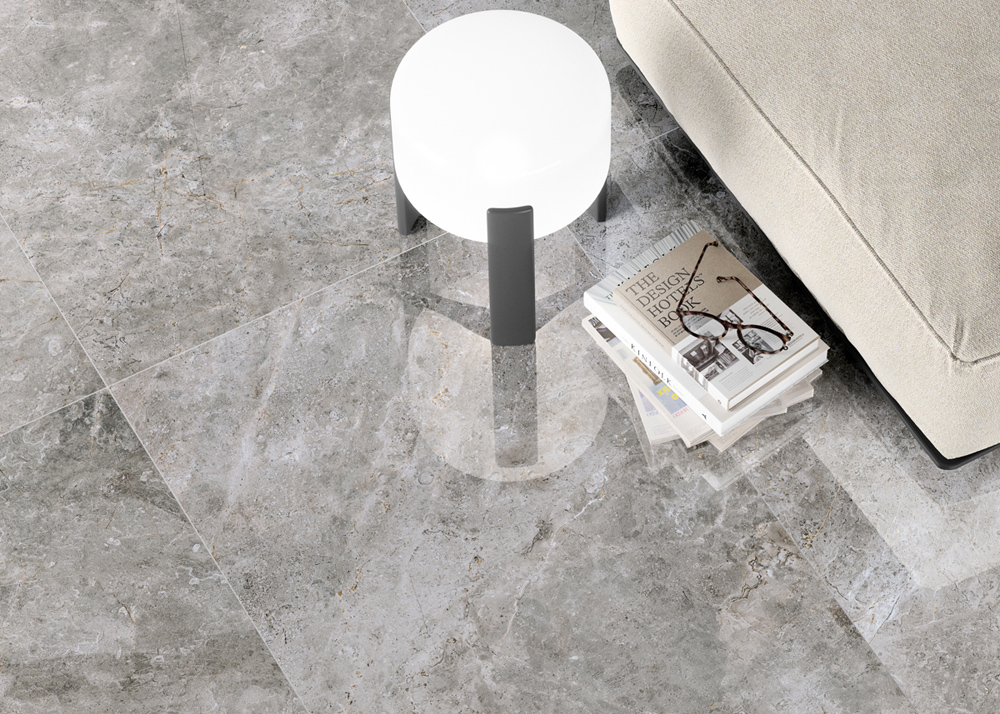General advice for routine cleaning
REFIN porcelain stoneware is an unglazed natural porcelain ceramic product, normally classified as UGL, meaning unglazed, with high technical performance in terms of mechanical resistance, resistance to chemical agents, and stain resistance. The surface is generally satin-finished, not glossy, and more or less smooth depending on the type, with very natural aesthetic effects similar to natural stones.
These floors do not require special treatments after installation, but some precautions are necessary for routine maintenance.
Current floor cleaning methods—particularly the use of detergents containing fragrances or substances that eliminate the need for rinsing, and the use of a «mop» as the main tool for cleaning and drying—result in the formation of a film on the surface of unglazed natural porcelain stoneware tiles. This film is left behind by detergent residues and alters both the appearance and behavior of the surface.
The incorrect recommendation that ceramic tiles should only be cleaned with water causes dirt, limescale, etc., to stick to the surface without being absorbed by it (all porcelain stoneware has a water absorption rate of less than 0.5%).
For these reasons, tiles may appear shinier than normal after a certain period of use, the wettability of the surface is distorted, and the dropping of food or other substances can leave halos because this seemingly oily film is removed at the point of impact.
This film must be periodically removed using degreasing agents that are commonly available on the market, although better results can be achieved with more specific detergents.
It is advisable to use detergents that contain a percentage of buffered acid, applying them with a rough cloth using a normal floor brush («spazzettone»), scrubbing with some effort, and then rinsing and drying with a cloth (preferably microfiber).
These detergents can also be used for regular cleaning by diluting them more in water, or by using those classified for daily use that are free from perfumes, waxes, or substances that prevent rinsing.
There are countless products available on the market—advertised on TV or in magazines—for this purpose, but the use of more specific detergents, which are typically available from ceramic retailers, is recommended; in particular:
| BRAND | CLEANSER | WEB SITE |
|---|---|---|
| FILA | DETERDEK | www.filasolutions.com |
| FABER | TILE CLEANER | www.faberchimica.com |
| BONASYSTEMS | BONA CLEAN | www.bonasystemsitalia.it |
In particular, Bonasystems also offers a convenient and effective cleaning kit. By visiting their websites, you can find the addresses of distributors and access technical support.
The periodic use of these detergents, the good habit of avoiding substances with any kind of additive, and the use of appropriate tools help keep the floor clean and maintain its original satin finish.
The use of proper detergents is essential for achieving good results.
Detergents containing additives such as perfumes, waxes, etc., are strongly discouraged, in addition to the previously mentioned solutions.
REFIN recommends the company: FLOOR SYSTEM S.A.S (www.floorsystem.net)
This company offers:
- A technical consultant available to help solve various issues
- Free sample kits upon request
- Supply of professional products based on individual needs (even just one liter at a time)
Cleaning the floor after installation
It is absolutely not sufficient to wash the floor with water alone, and the use of substances such as kerosene, vinegar, etc., is strongly discouraged.
Instead, the tiles must be cleaned using acid-based detergents specifically formulated to remove lime residues from grout and fillers, which tend to attract and hold dirt.
The ideal approach, after an initial rough cleaning, is to wait for the grout to fully set and then apply the specific detergents according to the manufacturer’s instructions.
Routine maintenace
| DIRT TYPES | DETERGENTS |
|---|---|
| Oils and vegetable and animals fats, beer, wine, coffee, food wastes. Nicotine, tea, shoe polish etc. | Specific alkaline-based detergents, caustic soda, potash |
| Inks, rust stains, felt pen | Specific acid-based detergents, muriatic acid, oxalic acid |
| Oils and mineral (mechanical) fats, tyre/tyre rubber, resins or paints, candle wax, synthetic shoe polish | Solvents: trichloroethylene, niter diluent, turpentine, acetone |
| General greyness, colour loss due to dirt accumulation | Acid and solvent detergents |
| Daily cleaning | Common detergents free from waxes or perfumed oils |
Examples of cleaning products
| CLEANSER | CHARACTERISTIC | MANUFACTURER |
|---|---|---|
| CB 90 | NEUTRAL ALCOHOLIC | GEAL |
| 814 | BASIC | CHESTERTON |
| PS 87 | BASIC | FILA |
| SERVICE ALCALE | BASIC | GEAL |
| TILE CLEANER | SLIGHT ACID | FABER CHIMICA |
| CEMENT REMOVER | ACID | FABER CHIMICA |
| DELTA PLUS | ACID | KERAKOLL |
| DETERDEK | ACID | FILA INDUSTRIA CHIMICA |
| KERANET | ACID | MAPEI |
| PH 0 | ACID | FILA |
| SERVICE SOLVACID | ACID+DISSOLVENT | GEAL |
| CHESTERTON | ph. (781) 438.7000 | www.chesterton.com |
| FABER CHIMICA | ph. (+39) 0732.627178 | www.faberchimica.com |
| FILA | ph. (+39) 049.9467300 | www.filasolutions.com |
| GEAL | ph. (+39) 0574.750365 | www.geal-chim.it |
| KERAKOLL | ph. (+39) 0536.816511 | www.kerakoll.com |
| MAPEI | ph. (+39) 02.376731 | www.mapei.com |
General porcelain tile cleaning suggestions
Make sure the professional layer has carried out a proper cleaning with the specific products to remove all installation residues. As for daily cleaning, do not use products containing wax or perfumed oils, most suitable for the traditional glazed tiles (for example bathroom tiles). The surface of REFIN’s porcelain stoneware tiles is completely vitrified and compact; their superficial absorption is at the lowest levels (lower than 0·5%), therefore it is possible to use aggressive cleaners with no particular restrictions by simply following the supplying company instructions. Any further waterproofing or aesthetic treatment, which may be carried out after installation, must undergo a preventive test since, as previously mentioned, porcelain stoneware tiles do not usually need such kind of treatments. The installation rules are to be considered valid either for GL surfaces and UGL surfaces, while the cleaning procedures are easier for the former ones thanks to the glaze presence even if the same methods can be used as REFIN’s tiles are acid and base resistant.


